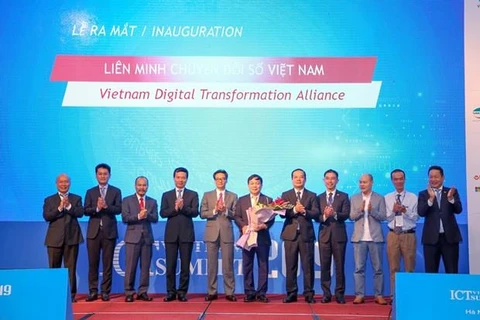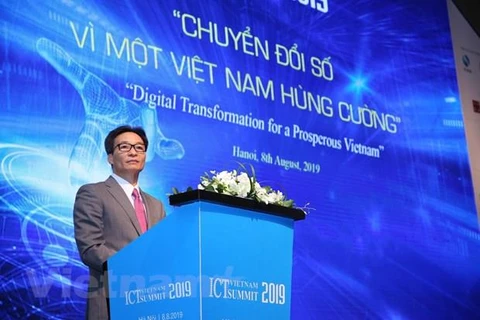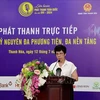Hanoi (VNA) - In 2019, Vietnam plans to have a national digital transformation strategy, towards a digital economy and digital society. Digital transformation will be a revolutionary conversion, fundamentally changing the country’s facelift.
This is also Vietnam’s new task, opportunity and challenge in the digital age, but also a motivation for the development of information technology human resources, contributing to the country’s digital transformation.
Digital transformation - opportunities and challenges
The digital transformation is taking place in the world at a high pace, affecting many fields and relationships in the global economy, and opening up great opportunities for businesses to increase competitiveness.
According to Microsoft’s study from 2017 in the Asia-Pacific region, digital transformation contributed about 6 percent to GDP in 2017, and the figure is expected to rise to 25 percent in 2019 and 60 percent from 2021.
Digital transformation is a chance for Vietnam to increase labour productivity, promote innovation and improve national competitiveness.
This is also an opportunity for developing countries like Vietnam to catch up, accompany and rise up. Minister of Information and Communications Nguyen Manh Hung affirmed "digital transformation is an opportunity and an advantage of Vietnam."
Advantage for digital transformation
Digital transformation is the integration of technology and digital technology into every corner of each organisation's operation, with the main goal of increasing operational efficiency and improving customer’s satisfaction, and furthermore creating a competitive advantage in the market.
 Vietnam is ranked 13th among the 20 countries with the highest proportion of Internet users in the world.(Photo: AFP)
Vietnam is ranked 13th among the 20 countries with the highest proportion of Internet users in the world.(Photo: AFP) Digital transformation is a revolution on policy and institution rather than a revolution on technology. With the trend of strong digital transformation, it is necessary to have awareness and timely policy, thereby creating unity in entire society. In addition, the will and aspiration of the whole political system, businesses and people of Vietnam on the common goal of building a prosperous country will create momentum for Vietnam to conduct digital transformation successfully.
Minister of Information and Communications Nguyen Manh Hung said: "If we build appropriate policies, Vietnam will take advantage of this opportunity to become a developed country."
By the end of 2018, nearly 70 percent of Vietnamese people had been using the Internet. According to statistics of Miniwatts Marketing, Vietnam is currently ranked 13th among the 20 countries with the highest proportion of Internet users in the world.
Vietnam ranks 25th out of 39 on the list of countries studied with the highest percentage of people possessing smartphones in the world, leading Southeast Asia.
Vietnam is also a nation with the highest increase in the number of smartphone users in the world with a growth rate of about 18 percent (the 2015-2019 period). This is considered an advantage of Vietnam in carrying out digital transformation.
Furthermore, IT companies, technology infrastructure and the rate of technology use in Vietnam are growing very fast, along with a young, intelligent workforce who is eager to learn, creative and aspiring to get rich. They will be a key force for the country's building and development.
Difficulties remained
Vietnam is a low-middle income country so there are difficulties and challenges in digital transformation.
Legal frameworks and policy corridors on information and communication technology are incomplete, failing to meet the supporting role for economic development in the industrial revolution and digital transformation, along with unsynchronised technology infrastructure and lack of foundation for high-tech industry. In addition, investment in technology research and innovation and IT personnel training is low as compared to many countries in the region and the world.
Nguyen Dinh Thang, Vice President of the Vietnam Digital Communications Association (VDCA), said that the National Assembly and the Government should soon build and promulgate laws and legal frameworks in fields related to innovation in order to create, encourage and support the development and application of technology 4.0, especially creating a favourable environment for businesses’ development. Furthermore, the Government must be the largest customer for projects on the application of technology 4.0, public services provision and applications for smart cities.
The current shortage of human resources in IT is also a problem to accelerate the digital transformation process in Vietnam. At the outset of 2019, Viettel announced its recruitment of up to 500 IT staff. The Vietnam Post and Telecommunication Group’s Information Technology Company (VNPT IT) in April also announced to recruit 500 IT engineers. The Vietnam Post and Telecommunications Group needs an additional 5,000 IT engineers.
 The current shortage of human resources in IT is also a problem to accelerate the digital transformation process in Vietnam. (Photo: VietnamPlus)
The current shortage of human resources in IT is also a problem to accelerate the digital transformation process in Vietnam. (Photo: VietnamPlus) To ensure IT workers, Vingroup has signed cooperation agreements with more than 50 universities to receive about 100,000 IT graduates within the next 10 years.
According to statistics from recruitment platform TopDev of the Applancer JC Company, Vietnam is estimated to face a shortage of 190,000 IT workers by 2021. In addition, only 30 percent of 50,000 IT bachelors graduating from universities every year meet the job requirements and can work immediately, and the remainder need refresher training on foreign languages, soft skills and new technology. The shortage of IT human resources will be a difficult problem for Vietnam.
To grab opportunities from digital transformation and overcome difficulties during the process’s implementation, Minister of Information and Communications Nguyen Manh Hung proposed that Vietnam should choose a three-step digital transformation strategy.
According to the minister, Vietnam needs to accelerate the digitisation of fields and industries. Digital transformation in businesses and in society will increase labour productivity and create new growth opportunities. The country also needs to use digitisation as a competitive advantage at home and abroad, and to work towards building a comprehensive digital economy, with all fields digitised and new digital industries established./.
























